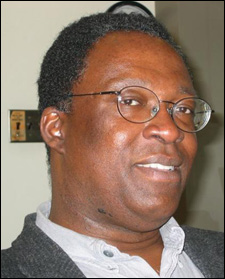V. Kofi Agawu, musical scholar, appointed professor
Music ‘Renaissance man’ joins FAS

Musical theorist V. Kofi Agawu, a scholar whose research and writing span musical traditions from Gustav Mahler to the Ewe people of Ghana, has been appointed professor of music and African and African-American studies in Harvard University’s Faculty of Arts and Sciences, effective July 1.
Agawu, 49, is currently professor of music at Princeton University and a visiting scholar at the University of Ghana.
“Professor Agawu is a rare scholar whose professional interests cross traditional boundaries within musical scholarship, encompassing music theory, ethnomusicology, and historical musicology,” says William C. Kirby, Edith and Benjamin Geisinger Professor of History and dean of the Faculty of Arts and Sciences. “He demonstrates deep commitment to two very different musical traditions, in 18th and 19th century Europe and in West Africa, linking the two through his attention to music’s structure and significance within specific historical and social settings. He is widely regarded as a thoughtful and considerate colleague and a wonderful influence on his students.”
Agawu is author of three scholarly books: “Playing With Signs: A Semiotic Interpretation of Classical Music” (Princeton University Press, 1991), “African Rhythm: A Northern Ewe Perspective” (Cambridge University Press, 1995), and “Representing African Music: Postcolonial Notes, Queries, Positions” (Routledge, 2003). The first book, an analysis of the use of signs and symbols in the works of 18th- and 19th-century European composers including Haydn, Mozart, and Beethoven, won the Society for Music Theory’s 1994 Outstanding Publication Award. Among European composers, Agawu has also written extensively on Mahler, and on Chopin, Schubert, and Stravinsky.
Agawu’s second book reflects his interest in the musical traditions of the Ewe people of Ghana, and in the rhythmic underpinnings of their language, song, and drumming. Agawu has conducted extensive fieldwork in Ghana; his status as an Africanist is underscored by his longstanding affiliation with the University of Ghana and his authorship of substantial articles on numerous issues in African music.
Agawu’s third book is a provocative critique of the order of knowledge about African music, reflecting his interest in the aesthetics and ethics of scholarly protocol and in the related field of postcolonial theory. Writing in Music Theory Spectrum, Veit Erlmann, professor of ethnomusicology at the University of Texas, Austin, said, “Few books in recent years have pursued a more ambitious agenda. … [It is] without doubt the most powerful theoretical intervention in African musicology in a decade or more.”
A native of Ghana, Agawu earned a bachelor’s degree in music from Reading University in the United Kingdom in 1977, a master’s degree in musical analysis from King’s College London in 1978, and a Ph.D. in historical musicology from Stanford University in 1982. He is also certified by the Royal Academy of Music in the teaching of singing and by the Royal College of Music in musicianship and theory.
Agawu has taught at Princeton since 1998, having taught earlier at Yale University, Cornell University, King’s College London, Duke University, and Haverford College. His honors include the prestigious Dent Medal in 1992, awarded by the Royal Musical Association and International Musicological Society for “outstanding contribution to musicology.”




